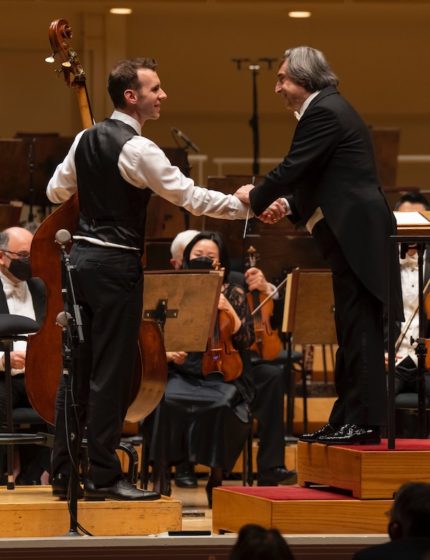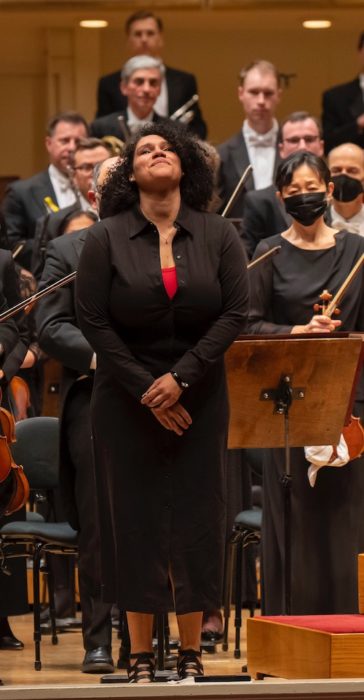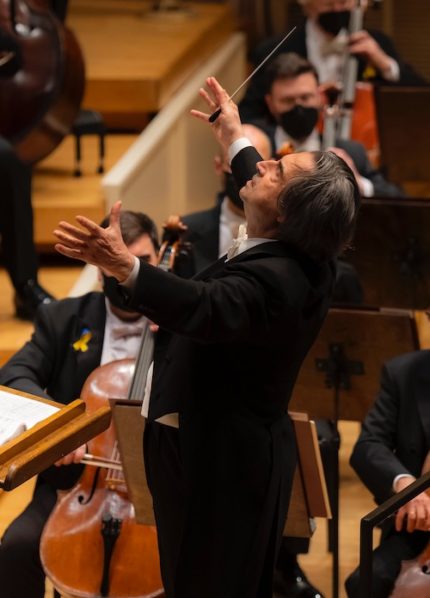Muti returns, with a heartening premiere and charming Beethoven

There was an extra bit of volume and enthusiasm in the applause that greeted Riccardo Muti as he strode on stage Thursday night at Orchestra Hall. The occasion marked the first appearance of the Chicago Symphony Orchestra music director after his bout with Covid-19 earlier this month necessitated his withdrawal from a week of concerts. The maestro looked hale and recovered, leading the program with characteristic focus and energy.
The evening led off with the world premiere of Jessie Montgomery’s Hymn for Everyone, the CSO composer in residence’s first commission and the second work of hers to be played by the full orchestra (after her Coincident Dances last October).
During the pandemic and after the death of her mother last May, Montgomery was experiencing an “intense writer’s block.” Discovering a poem of her mother’s titled “Poem for Everyone,” she began work on this CSO commission in earnest, writing a “meditation for orchestra” that also marked a tribute to her late mother.
A bell chime immediately leads into a rising, heartening main theme with a twisty close, first heard in violas. That “hymn” motif is repeated for the same forces before being heard in a resplendent full orchestra statement against a shimmering gong. The work amounts to a slowly unfolding sequence of not-too-varied variations, moving to English horn, and a pair of flutes. A more resolute striding section appears, marked by sharply accented strings and timpani, before the tempo slows once again, the work ending on a feeling of catharsis with a hopeful lingering trumpet note over two flutes.
There are some minor issues. The emphatic two-note string phrase goes on in unvaried fashion too long, and one would have liked her to utilize the soloistic resources of the CSO principals a bit more. That will likely happen in her scheduled future CSO commissions.
Yet Jessie Montgomery’s music has been consistently impressive and Hymn for Everyone is her finest effort heard locally to date. She could hardly have wished for a more communicative or sensitive sendoff than that delivered by Muti and the orchestra Thursday night.
Few contemporary composers seem to have the ability to write a melody that stays in the memory and Montgomery’s hymn theme is lovely and indelible. The 12-minute work feels like a throwback—in a good way—to mid-20th century American music centered on a tonal lyricism, albeit with an unflinching eye and lack of sentimentality.
More broadly, many recent music and arts commissions often seem angry and reactive, centered on conflict, divisiveness and partisan polemics. As reflected in its title, Montgomery’s Hymn for Everyone feels not only timely but necessary, even healing in its emotional sincerity and Beethoven-like embrace of humanity.

Fittingly, music of Beethoven closed the evening.
Riccardo Muti has been plugging gaps in his interrupted Beethoven cycle from the 2019-20 season, left uncompleted by pandemic cancellations. This week’s concerts bring us—amazingly—the first Symphony No. 6 of his Chicago tenure.
Some might feel that Muti’s approach to Beethoven’s “Pastoral” symphony—a musico-pantheist paean to nature by the outdoors-loving composer—is a bit “old-fashioned,” employing large string sections and stately tempos throughout.
But Muti led a lightly spun and gracious account that made for a remarkably fresh performance of this familiar work. There was none of the tense, relentless quality that can overpower Muti’s even-numbered Beethoven symphonies. Even with the large string choirs, Muti dexterously scaled down the playing to nearly chamber dimensions.
This was a gentle and affectionate “Pastoral,” an expansive day in the country, with repeats observed. Yet Muti paced the opening movements so skillfully that it never felt too long. Indeed, this performance seemed to convey the essence of the music with a relaxed contentment and airy, al fresco charm—much more successfully than some ascetic, historically minded speed merchants who dash through the woods.
Beethoven’s musical onomatopoeia sounded naturally throughout, as with the first violin’s flickering vibrato painting the rippling stream rivulets in the second movement. Muti kept the bucolic woodwinds down more than usual yet that made the tripartite avian solos near the coda—nightingale (flute), quail (oboe) and cuckoo (clarinet)—emerge that much more delightfully.
All was supported with a firm and incisive foundation by cellos and basses. The rustic dance of the village festival was aptly carousing and, though the thunderstorm was imposing, it was kept in scale without excess volume or intensity. The finale provided the requisite beneficent glow after the tempest.

The CSO music director has been generous in giving principal players—nearly all of whom are Muti hires—spotlight opportunities during his tenure. The centerpiece of the evening was Giovanni Bottesini’s Double Bass Concerto No. 2 in B minor with principal bass Alexander Hanna as soloist.
Appointed to the CSO first chair in 2012, Hanna has been a supreme section leader over the past decade. While this is his second subscription solo outing after playing a Vanhal concerto in 2015, it should not be overlooked that Hanna also gave an inspired local premiere of Missy Mazzoli’s Dark with Excessive Bright online last summer, which was a Top Ten Performance of 2021. Mazzoli’s work is among the finest bass concertos of recent decades (and that concert is still available for free viewing at cso.tv).
A bass virtuoso himself, Bottesini composed voluminously for his own instrument, as well as in other genres including a dozen operas, a requiem, and several orchestral works.
His Bass Concerto No. 2, heard in its belated CSO debut, is characteristic of Bottesini’s music—surely crafted and engaging, yet with a certain busy anonymity and lack of individuality.
The Second Concerto is the least overtly flashy of Bottesini’s three concertante works for his instrument, which suited Hanna’s low-key style. The soloist played with mellow aristocratic tone, easy facility and, largely, technical polish. The work’s prevailing slow tempos (framing movements are Moderato and Allegro) provide less bravura fizz than one would expect but Hanna handled the extant challenges with estimable assurance and elan. The Andante was the highlight, with Hanna’s cantabile tone and subtle dynamic nuance bringing limpid expression to the aria-like theme.
Muti led a typically adroit, alertly balanced accompaniment that kept the 22-player string ensemble down, with the subterranean solo instrument always audible. Clearly delighted by the performance, the conductor warmly shook Hanna’s hand, giving him an affectionate Italian face pat as well.
The program will be repeated 7:30 p.m. Friday at Wheaton College, 8 p.m. Saturday and 7:30 p.m. Tuesday at Symphony Center. cso.org
Posted in Uncategorized


